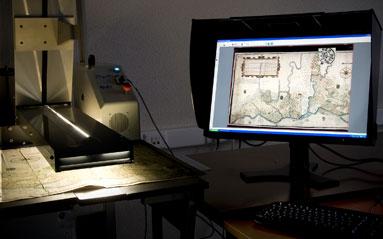ADOCHS (Auditing Digitalization Outputs in the Cultural Heritage Sector) (2016-2021)
For a better quality of the digitized collections

On November 1st 2016 the CegeSoma launches the ADOCHS project (Auditing Digitalization Outputs in the Cultural Heritage Sector) in collaboration with the Royal Library of Belgium (KBR), VUB and ULB. This project is dedicated to the improvement of the quality control process concerning the digitized heritage collections. On the basis of written and iconographic sources, the team will develop methodological and technical tools needed to guarantee a control of the quality of the technical aspects and of the quality of the metadata.
Future More Deliberated Digitisation Projects
Since the mid-nineties, cultural institutions have undoubtedly entered the digital age. In Belgium, the government adopted in 2004 a first digitization plan for a ten years period which has led to the realisation of nine digitization projects in the federal scientific institutions. The website The Belgian War Press of CegeSoma is one of its concrete results. In 2014, a second phase has been launched, allowing institutions to continue the work done during the past decade. If the first projects are now completed, it was sometimes at the cost of many human and financial efforts in order to overcome the difficulties. The expertise accumulated during the first decade can help us to engage future projects in a more well-thought out manner. It is precisely in this context that the ADOCHS project was initiated.
Quality Control, a Key Step in the Digitisation Process
The issue of quality control was one of the major obstacles in the first phase of digitization. Indeed, it appeared that many projects had underestimated the extent of this step both in human and technical terms in the overall process of digitization. In most cases, teams were faced with a lack of methodological standardization and automation tools to perform the job. They therefore often had to work manually, without procedural guidelines adapted to their specific needs. However, it is clear that quality control is an essential component to every stage of a digitization project if you want to ensure the integrity and consistency of files and data produced, as well as their long-term conservation. This is true both for outsourced or internal digitizing project
Better Access to the Collections
In addressing the issue of quality control, this project aims to speed up the whole digitizing process while minimizing the costs and also to increase the value of the data produced in the framework for future digitization projects. While federal scientific institutions will be the main beneficiaries, the purpose of this research addresses a much broader need that affects all heritage institutions in Belgium and abroad. Furthermore, the wide public will also benefit from a better access to the collections thanks to an optimisation of the available metadata and to the better digitization of images as compared to the original documents.
A Double Approach
The goal is to address the issue in two stages. First, by focusing on methodological aspects, proposing guidelines applicable in the treatment of heritage collections. Then, by developing technical tools that automate tasks related to quality control or support the manual check. Both technical aspects (image resolution, file integrity formats, etc..) and content metadata (descriptions of collections, compliance with XML schema's, etc..) will be taken into account. In this perspective, it is expected to work on two types of collections: the digitized collections of the Royal Library of Belgium that will address the problems with textual documents and the photographic collections of the CegeSoma which provides a set of iconographic documents.






